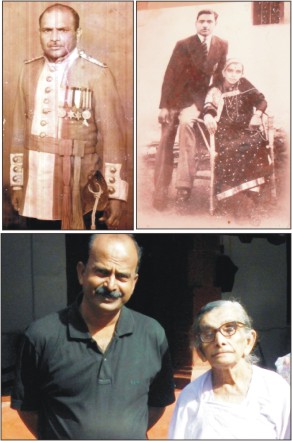Late Subedar B.M. Uthaiah was a Prisoner of War for 5 years in Malaya

Caption: 1) Late Subedar B.M. Uthaiah. 2) For KEEPSAKE: The Uthaiah couple. 3) The author Ex-Sgt. M. N. Subramani seen with Subedar Uthaiah’s widow Dotty Thangamma at her native village in Virajpet.
By Mandetira N. Subramani, President, VeKare Ex-Servicemen Trust, Mysore.
Late Subedar Baltikalanda Medappa Uthaiah was born in Virajpet taluk, Kodagu District, on 13th November 1908. He did his schooling in Virajpet. After completing his SSLC , he took up a job in a Co-operative Society in Mysore.
A good sportsman and a brilliant hockey player, he used to actively participate in various athletic meets and hockey tournaments. His brilliance in sports and games got noticed by the then Mysore Land Force Officers and offered him a job in the Mysore Infantry as Havildar. Thus late Sub B.M. Uthaiah joined the first Battalion of Mysore Infantry in 1932 and went on to become a World War-II hero in his own right.
As a young combatant soldier, Uthaiah married Kodira Mandanna’s eldest daughter K.M. Dotty Thangmma in April 1940 while he was a Jamedar and at the time when the II World War had started. Jamedar Uthaiah became part of Indian Army as First Battalion, Mysore Infantry, which merged with the British Indian Army.
In Dec. 1940, that is within six months of his marriage, Jamedar Uthaiah proceeded to Bhopal in Madhya Pradesh for additional training in preparation for participation in the World War-II. After completing his training at Bhopal, he along with other members of Indian Army were shipped directly to Malaya from Bombay without even getting a chance to meet his wife and family for fighting against Japanese Army which was marching towards India through Burma.
As soon as the ship berthed in Malaya, the Indian soldiers were engaged in fierce fighting with the relentlessly marching Japanese Army. However, after a few days of fierce fighting for quite some time, the entire Indian battalion in which Uthaiah was fighting was surrounded by the Japanese Army and Jamedar Uthaiah was taken as Prisoner of War (POW) by Japanese Army. He along with other members of battalion were taken to Japan and put in a POW camp which was more like a concentration camp rather than POW camp.
Jamedar Uthaiah was subjected to severe torture and ill treatment by the POW camp authorities who were well-known for their ruthless brutal treatment to their prisoners. Since the prisoners were not permitted to communicate with any one outside the camp, Jamedar Uthaiah’s whereabouts were not known to any one in India including his Army Unit. His wife and family were totally distraught without any news of Jamedar Uthaiah.
His father Baltikalanda Medappa passed away in 1943 because of the sufferings of separation of his son and non-availability of any information about the son’s existence. The relatives and well-wishers of Jamedar Uthaiah and his wife Thangamma had concluded that he had become the war casualty and started preparation for re-marriage for Thangamma.
However, Thangamma was adamant and stood firm against re-marriage. She instead tried to find solace and comfort by visiting various temples in Coorg to pray for her husband’s safe return. Even after the end of World War-II, the whereabouts of Jamedar Uthaiah were not known and there was no communication from any quarter regarding his existence. During October 1945, after a gap of five years, the family members were informed regarding the arrival of Jamedar Uthaiah at Bangalore through a telegram which was received from Malaya via Colombo.
Immediately after arriving at Bangalore, Jamedar Uthaiah had to face a trial by British Army for possible involvement in Indian National Army (INA) activities. Finally, in December 1945, he was permitted to meet his wife Thangamma in Bangalore, who was very sick by then due to emotional suffering. He was subsequently posted to Bangalore till 1947.
He had to once again rush to Hyderabad in 1948 along with his unit to tackle the Razakars and to take part in the Hyderabad liberation which was successfully completed. However, he was very frustrated by all the treatments that he received from the British Indian Army in spite of all his sufferings and sacrifices. He finally took voluntary retirement in 1950 from the Indian Army and went back to his native district Kodagu. Subedar Uthaiah died on September 25, 1978, at the age of 69 like a true soldier unsung, unheard. His widow Thangamma, who is 92 years of age, now lives in Arji Village, Betoli post near Virajpet along with her youngest son, Bopanna. Uthaiahs were blessed with two daughters and four sons.
Late Subedar Uthaiah’s sufferings as a combatant soldier and a POW at Malaya during and after World War-II did not demoralise him in his life and he never thought ill of careers in Armed Forces when his son decided to join the Indian Air Force. True to the tradition of martial race to which he belongs to, as a Kodava, he encouraged his son, who was born after he returned to India from Malaya, to join the Arm-ed Forces in independent India. His second child B.U. Chen-gappa, an Engineering graduate, took commission in the Indian Air Force and went on to become a highly decorated Air Marshal in IAF.
Air Marshal Baltikalanda Uthaiah Chengappa, PVSM, AVSM, VSM retired in early 2000. Before his retirement, he held the appointment as Air Officer Commanding, Maintenance Command IAF.
Like father so is the son. A real chip of the old block. Air Marshal Chengappa went on to prove that Kodagu is indeed a cradle of mighty Generals, Air Marshals and valiant soldiers.
source: http://www.starofmysore.com / Features / November 10th, 2011

